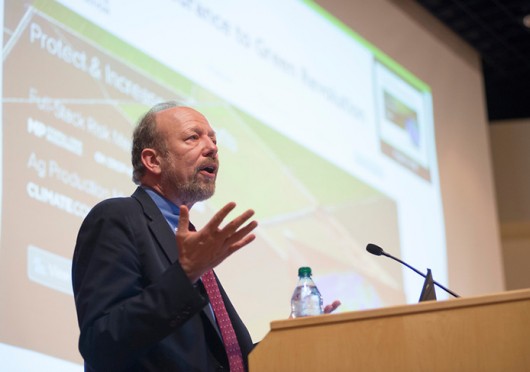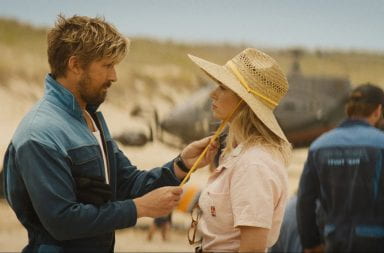
Joe Gurin speaks at the Big Data Conference, which was held from March 19-21 at OSU.
Credit: Courtesy of Barbara Peck
The Big Data Future conference hosted industry experts from the likes of IBM, Microsoft Corp. and Twitter Inc. last week to talk about the possibilities for big data to improve economic, social and political life.
“Big data is about using all kinds of data in large quantities in ways that can be analyzed in sophisticated ways that wouldn’t be possible without data of that magnitude,” said keynote speaker Joel Gurin in an interview with The Lantern before the conference.
Gurin is the founder of Open Data Now, which posts public data, and former chair of the President Barack Obama White House Task Force on Smart Disclosure.
Peter Shane, professor at Ohio State Moritz College of Law and adviser of the student-run journal at Moritz College of Law, “I/S: A Journal of Law and Policy for the Information Society,” said the conference was a “crash course for non-experts in what big data is all about.”
“This big data phenomenon seems to be showing up everywhere in peoples’ lives … There’s all kinds of claims made about how this is all wonderful or may be threatening,” Shane said.
The conference brought together a group of scholars to discuss how data is collected, challenges and limitations it faces, and opportunities it provides in terms of building the economy and holding the government accountable, Shane said.
Gurin, who was one of 26 participants, according to the conference website, said there are ways to make more big data “open data.”
“Open data is about making data publicly available. If you think about the data the NSA is collecting about individuals, that’s big data but that’s not open data,” Gurin said. “What data do consumers need to make choices that are important in their lives? That’s what I’ve been working on.”
Gurin said the ability to analyze both types of data is vital for consumers and businesses.
“You can build a $1 billion business literally off free government data … The Climate Corporation took a lot of data on weather and other factors and they analyzed it to such a degree that they can help farmers increase profitability by 20 to 30 percent. They built (their business) off basic data that theoretically anyone could use. What they brought to it was the ability to analyze it brilliantly,” Gurin said.
Scientific research is a notable area where big and open data is increasingly used, Gurin said.
“If you can share data among scientists early on, you can make progress much more rapidly,” Gurin said.
Ray Harishankar, IBM Fellow and vice president of Technology and Innovation within IBM Global Business Services, said he was excited to talk about the applications of big data in the social media sphere.
“How can I look at social media, like Facebook? How can I look at what’s being said in social media and drive businesses (from it)?” Harishankar said.
The free, three-day conference was hosted and organized by “I/S: A Journal of Law and Policy for the Information Society.”
Shane said I/S puts on conferences annually, but this year’s was the largest one they’ve hosted.
“Every spring, we put on a conference on some topics at the intersection of law, policy and information technology. This conference is a kind of celebration of the journal’s 10th anniversary … We were able to get a grant to support the conference from the Battelle Endowment for Technology and Human Affairs,” Shane said.
The grant totaled $42,244, Shane said, used for covering the majority of the conference’s costs.
The Center for Interdisciplinary Law and Policy Studies at the college and the Battelle Center for Science and Technology Policy also helped sponsor the event.
Rehgan Avon, a third-year in industrial and systems engineering, said she attended the conference to supplement course work in her major.
“I (went) mostly because my major just started a new analytical track … (Big data) has really interested me for a while and (the conference was) on campus so (it was) convenient,” Avon said.
Avon echoed Gurin’s hopes of making big data more accessible.
“The most surprising thing I learned was the fact that they’re a lot of restrictions on access to data and that’s affecting things that can be life changing for people,” Avon said.


